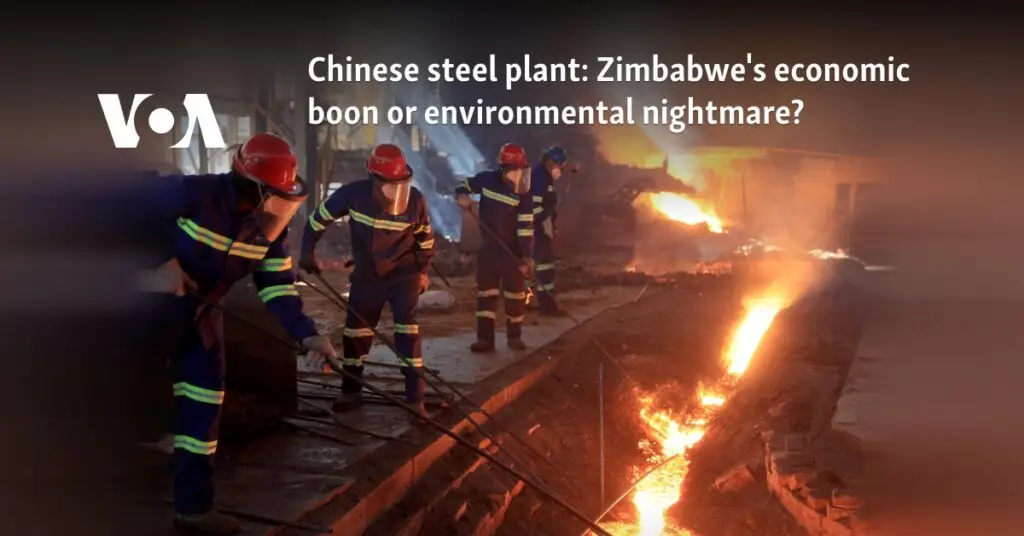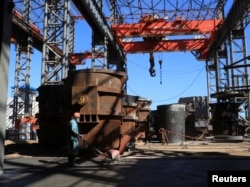Zimbabwe is set to host Africa’s largest steel plant, but controversy over the project continues even as it ramps up production.
Over the past few months, villagers have accused Dinson Iron and Steel Company, or DISCO, a subsidiary of a Chinese steel mill, of seizing their land without compensation, damaging the environment and failing to help resettle them.
In addition to the impact of the climate crisis, there are concerns that the project will also affect the food security of villagers living in areas near the plant.
The head of Mushenjere village in central Zimbabwe, 81-year-old Chokutula Chaanda, told VOA that the villagers are asking for help from all stakeholders. They are also calling on the Chinese steel company to follow through on promises of compensation and relocation.
“We call on all parties involved to intervene, come together and support our cause,” Chananda said. “As the rightful owners of the land, we deserve to be treated fairly by DISCO. We seek development, not destruction.”
DISCO, a subsidiary of China’s Tsingshan Holding Group, billed as one of the world’s largest stainless steel producers, denies any wrongdoing.
In June, some local villagers staged a protest and tried to prevent DISCO’s trucks from entering the plant. Villagers have accused the company of forcing residents to leave their farmland without compensation, resulting in food shortages and heavy dust pollution.
Chananda told VOA that while the company welcomed the investment and business development, residents felt the company’s behavior was disrespectful and indifferent.
A giant steel and mining company is building a wall around farmland and pastures in the area, further isolating families in the village of Mushenjere from their traditional sources of livelihood. Prior to 2021, when the steel mine came to Manhize, residents in the area relied primarily on farming for their livelihood.
The plant has displaced more than 100 families, leaving them poor and food insecure, according to villagers.
A September report released by the Center for Natural Resources Management concluded that China’s mining operations in Zimbabwe are not necessarily mutually beneficial.
“Evidence on the ground shows a widening rift between Chinese nationals and their Zimbabwean workers and host communities. Ordinary Zimbabweans increasingly accuse China of exhibiting colonial characteristics,” the report said.
In the report, the villages near the DISCO plant were conspicuously excluded from the engagement platforms by the Chinese company. “The lack of meaningful engagement and consultation has led to feelings of disenfranchisement and marginalization among affected communities,” the report added.
Promises of economic benefits
The $1.5 billion plant began production in July and is expected to create 10,000 new jobs when it reaches its final stages of production. It is currently running at 60% capacity and aims to reach 75% early next year.
Expected to be an economic boon for Zimbabwe, the country hopes to reap financial benefits from the project if steel can be exported from the plant in the future.
The steel industry could contribute about $5 billion to the national economy after Zimbabwe’s Minister of Mines and Mining Development, Winston Chitando, toured the plant in June.
Dinson Group project director Wilfred Motsi said the development was a major milestone in Zimbabwe’s manufacturing industry.
“We are going back to the glory days when Zimbabwe was recognized as one of the industrial hubs in Southern Africa because of the opening up of the steel industry,” Dinson Group project director Wilfred Motsi told Chinese state news agency Xinhua in June. .
Food safety and the environment
Despite promises of infrastructure development, including roads and housing, residents say there has been no progress. It is feared that the eviction has further strengthened the already fragile existence among the villagers. In August, the UN described the level of food security in Zimbabwe as “deteriorating rapidly after being hit by historic droughts”.
Chenjerai Mushore, chairman of the three affected villages, echoed these concerns, highlighting ongoing environmental problems and the slow compensation process.
Mushore claimed that the mine’s road upgrading project caused the dust pollution. He stressed the importance of urgent completion of the road project to reduce these risks.
Response to concerns
DISCO spokesman Joseph Shoko told VOA that the company is committed to protecting the environment and investing in state-of-the-art sewage ponds and chimneys.
Since the villagers’ farmland is now within the perimeter of the steel plant, Shoko said DISCO is also supporting 22 elderly people, who are considered heads of the household, by paying them $200 a month for food from February until they are resettled. .
Shoko told VOA that there are plans to support six more families. Shoko added that young residents are offered job opportunities instead of cash assistance. In addition, the company said it prioritized these residents for job opportunities pending relocation.
According to Mushore and Shoko, the mine is building new houses in the resettlement area designated to accommodate the displaced community.
Shoko further explained that compensation assessments are currently being conducted with the participation of government ministries.
“The final compensation amount will be determined by these ministries after a thorough assessment,” Shkoko concluded.
Chitando, Zimbabwe’s mining minister, did not respond to VOA’s request for comment.
Zimbabwe-China relations
Zimbabwe and China have maintained a strong alliance over the years. Relations deepened considerably when Western powers imposed economic sanctions on Zimbabwe during Robert Mugabe’s presidency. As international funding and investment declined, China emerged as a major backer.
Under the leadership of President Emmerson Mnangagwa, Zimbabwe and China upgraded their partnership to a strategic level in 2018. The move facilitated growth in Chinese investment, particularly in the extractive industry. However, the DISCO steel plant has been criticized by environmental and human rights advocates for its potential negative impact on the environment.
Zimbabwe’s environmental standards agency, the Environmental Management Authority, or EMA, is working with the Steel Mine to address issues raised by activists and villagers, said Amkela Sidange, the agency’s Environmental Education and Advocacy manager. He said the EMA was closely monitoring the implementation of the mitigation measures outlined in the previous environmental audit.
In response to VOA’s request for comment, the EMA said there are currently no environmental violations at the Dinson-Manhize plant; however, a “monitoring of progress on implementation of mitigation measures proposed for environmental compliance by the Agency during a previous Environmental Audit” was conducted several months ago.
The EMA said the steel company has addressed issues identified in the audit, including converting the access road from Dinson to Mavise to a tarred road to further reduce dust.
The company is applying for the necessary environmental licenses, including for wastewater discharges and air emissions, the EMA said, adding that it “will continue to monitor the plant to ensure completion within the specified time frame and to ensure that the development of the project is carried out in a certain manner.” that does not harm the environment or public health.”



